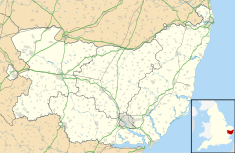The Corn Exchange is a commercial building in Abbeygate Street in Bury St Edmunds, Suffolk, England. The structure, which is currently used as a public house, is a Grade II listed building.[1]
| Corn Exchange, Bury St Edmunds | |
|---|---|
 Corn Exchange, Bury St Edmunds | |
| Location | Abbeygate Street, Bury St Edmunds |
| Coordinates | 52°14′42″N 0°42′44″E / 52.2449°N 0.7123°E |
| Built | 1862 |
| Architect | Ellis and Woodard |
| Architectural style(s) | Neoclassical style |
Listed Building – Grade II | |
| Official name | Corn Exchange |
| Designated | 7 August 1952 |
| Reference no. | 1076928 |
History
editThe first corn exchange in the town was on the ground floor of the old Market Cross in Cornhill which dated from 1584. The second corn exchange was designed by Benjamin Backson, built in ashlar stone and was completed, just to the south of the Market Cross, in 1836.[2][3][a] By the mid-19th century, the second corn exchange became inadequate, and civic leaders decided to commission a new corn exchange on the site of the old Shambles, just to the south of the second building.[1]
The foundation stone for the current building was laid by the mayor, William Henry Rushbrooke, on 18 June 1861. It was designed by Ellis and Woodard of Fenchurch Street in London in the neoclassical style, built by Lot Jackaman in ashlar stone at a cost of £7,000 and was officially opened by the then-mayor, Charles Beard, on 16 July 1862.[4][5] The design involved a symmetrical main frontage of seven bays facing onto Abbeygate Street. The central section of five bays featured a huge hexastyle portico formed by Ionic order columns supporting an entablature, a frieze bearing the inscription "The Earth is the Lord's and the Fulness Thereof", and a modillioned pediment with a bust of Queen Victoria flanked by figures depicting agriculture in the tympanum. The outer bays featured blocked round headed windows with architraves and pediments supported by brackets. Internally, the principal room was the main hall which was originally open but later surmounted by a glass roof supported by cast-iron columns and semi-circular stone arches: it was 119 feet (36 m) long and 82 feet (25 m) wide.[4]
The use of the building as a corn exchange declined significantly in the wake of the Great Depression of British Agriculture in the late 19th century.[6] In the 1960s, Bury St Edmunds Borough Council proposed the demolition of both the second and the third corn exchanges in order to create a parade of shops: the scheme was abandoned in the face of strong public opposition.[7] Instead, a floor was inserted allowing shops to be established on the ground floor in 1969. This also enabled the first floor to be used as an events venue and subsequent performers included the rock band, Slade, in April 1972[8][9] and the rock band, the Clash, in July 1978.[10] Following disturbances associated with the latter performance, the council banned live performances in the town for 20 years.[11] In July 2024, a local history society, the Bury Society, decided to oppose calls for a blue plaque to commemorate the performance by the Clash as the event had promoted "unruly behaviour".[12]
A major programme of refurbishment works, commissioned by Wetherspoons at a cost of £1.4 million and intended to allow the first floor to be used as a public house,[13] started on site in 2011.[14][15] After completion of the works, which involved the restoration of many of the original features including the entrance hall and main staircase, the building re-opened on 5 June 2012.[16] [17]
See also
editNotes
editReferences
edit- ^ a b Historic England. "Corn Exchange (1076928)". National Heritage List for England. Retrieved 28 April 2023.
- ^ Tymms, Samuel (1859). A Hand Book of Bury St. Edmunds, in the County of Suffolk. F. Lancaster. p. 55.
- ^ a b Historic England. "Former Public Library (1076929)". National Heritage List for England. Retrieved 28 April 2023.
- ^ a b Tymms, Samuel (1855). A handbook of Bury St. Edmund's. F. T. Groom. p. 92.
- ^ Pevsner, Nikolaus; Radcliffe, Enid (1974). Suffolk (Buildings of England Series). Yale University Press. p. 146. ISBN 978-0300096484.
- ^ Fletcher, T. W. (1973). 'The Great Depression of English Agriculture 1873-1896' in British Agriculture 1875-1914. London: Methuen. p. 31. ISBN 978-1136581182.
- ^ "Historian pens book about iconic Bury St Edmunds building". Suffolk News. 9 July 2017. Retrieved 28 April 2023.
- ^ "1972". Slade in England. Retrieved 28 April 2023.
- ^ "Slade". Setlist. Retrieved 28 April 2023.
- ^ "The Clash's 1978 visit to Bury St Edmunds to be recreated at The Apex 40 years on". East Anglia Times. 14 June 2018. Retrieved 28 April 2023.
- ^ "History". Bury Sound. Retrieved 28 April 2023.
- ^ King, George; Woodger, Andrew (14 July 2024). "Clash fan angry as blue plaque proposal dismissed". BBC News. Retrieved 15 July 2024.
- ^ "Wetherspoon pub chain leases Bury St Edmunds Corn Exchange". BBC News. 23 February 2012. Retrieved 28 April 2023.
- ^ "The Corn Exchange Wetherspoons". Visit Bury St Edmunds. Retrieved 28 April 2023.
- ^ "Bury St Edmunds Corn Exchange branded 'poshest' Wetherspoon pub in the UK". Suffolk News. 28 March 2023. Retrieved 28 April 2023.
- ^ Taylor, Martyn (2013). Bury St Edmunds Through Time. Amberley Publishing. ISBN 978-1445617879.
- ^ "Corn Exchange, Bury St Edmunds". Wetherspoons. Retrieved 28 April 2023.
Further reading
edit- Orbell, John (2017). A Handsome and Substantial Building…A History of Bury St Edmunds Corn Exchange. Taylor's End Press. ISBN 978-0956611123.
